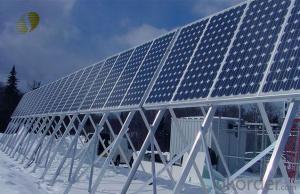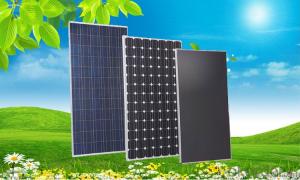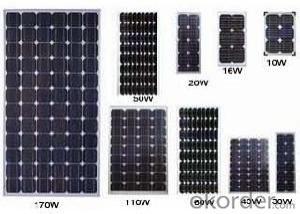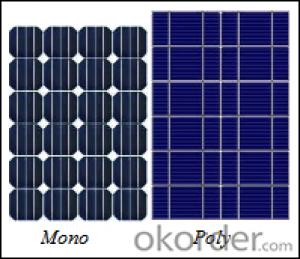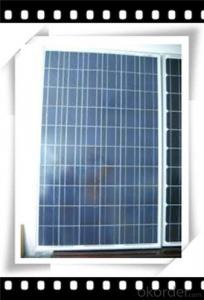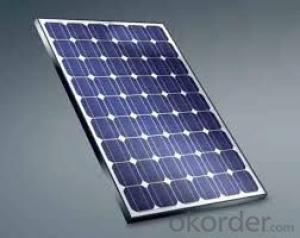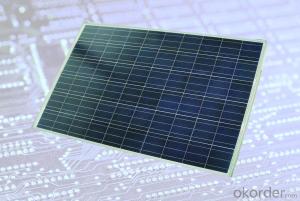80w Mini Monocrystalline Solar Panel CNBM - Solar Panels Port St Lucie
- Loading Port:
- Qingdao
- Payment Terms:
- TT OR LC
- Min Order Qty:
- 10 set
- Supply Capability:
- 300000 set/month
OKorder Service Pledge
OKorder Financial Service
You Might Also Like
Mini Monocrystalline Solar Panel with 14W
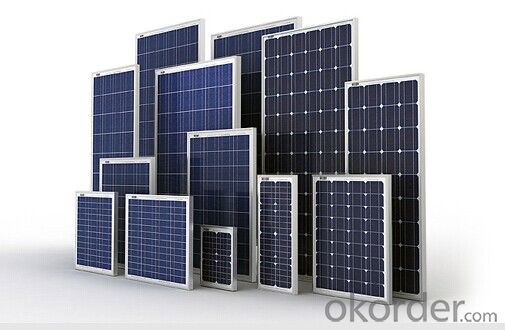
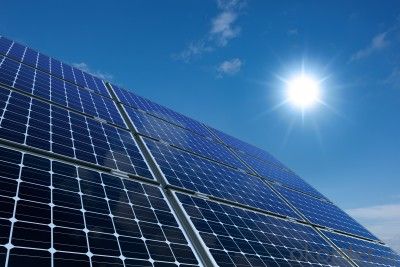
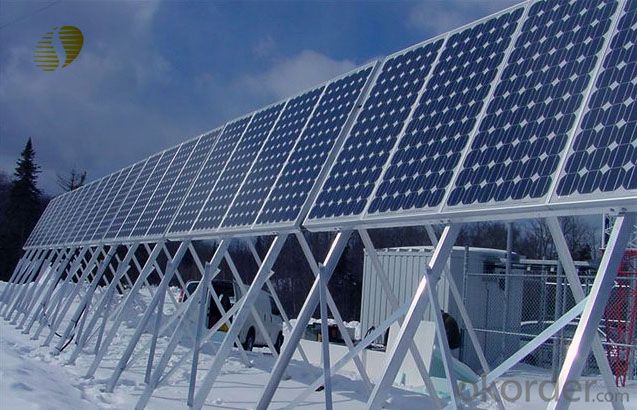
Monocrystalline Solar Modules
We offers a range of small, medium and large monocrystalline solar modules, designed for a range of requirements.
Specifications:
Tolerance | +/- 3% |
Cell | Monocrystalline silicon solar cells |
N0. of Cells | 72 (12 x 6) |
Dimension of Modules (mm) | 1581 x 809 x 40 |
Weight (kg) | 15.5 |
Limits:
Operating Temperature | -40~+85? |
Storage Temperature | -40~+85? |
Maximum System Voltage | 1000 VDC max. |
Hail Impact | Diameter of 28mm with impact speed of 86km/h |
Temperature and Coefficients:
NOCT | 48C+/-2? |
Voltage temperature coefficient (%/K) | -0.34 |
Current temperature coefficient (%/K) | 0.09 |
Power temperature coefficient (%/K) | -0.37 |
Characteristics:
Model: | SGM-160D | SGM-165D | SGM-170D |
Max-power voltage Vmp (V) | 34.5 | 35.4 | 35.8 |
Max-power current Imp (A) | 4.64 | 4.66 | 4.75 |
Open-circuit voltage Voc (V) | 41.75 | 43.6 | 43.32 |
Short-Circuit Current Isc (A) | 5.32 | 5.08 | 5.38 |
Max-power Pm(W) | 160 | 165 | 170 |
Model: | SGM-175D | SGM-180D | SGM-185D |
Max-power voltage Vmp (V) | 36.1 | 36.2 | 36.2 |
Max-power current Imp (A) | 4.85 | 4.97 | 5.11 |
Open-circuit voltage Voc (V) | 43.68 | 43.8 | 44.8 |
Short-Circuit Current Isc (A) | 5.49 | 5.48 | 5.51 |
Max-power Pm(W) | 175 | 180 | 185 |
STC: Irradiance 1000W/m2, Module temperature 25?, AM=1.5
Monocrystalline Solar Panels Specifications Range
Maximum Power (Pm) | Dimension | Weight | Operating Voltage (Vmp) | Operating Current (Imp) | Open Circuit Voltage (Voc) | Short Circuit Current (Isc) |
3W | 158x241x25mm | 0.5kg | 8.5V | 0.36A | 10.5V | 0.4A |
4W | 308x166x25mm | 0.77kg | 8.5V | 0.47A | 10.5V | 0.54A |
4W | 308.x166x25mm | 0.77kg | 16.8V | 0.24A | 21V | 0.27A |
5W | 296x215x25mm | 0.3kg | 16.8V | 0.48a | 21V | 0.54A |
10W | 286x406x25mm | 1.5kg | 16.8V | 0.59A | 21V | 0.66A |
12W | 286x406x25mm | 1.5kg | 16.8V | 0.71A | 21V | 0.8A |
14W | 286x541x25mm | 2kg | 16.8V | 0.83A | 21V | 0.96A |
16W | 286x541x25mm | 2kg | 17.2V | 0.93A | 21.5V | 0.99A |
18W | 296x541x25mm | 2.4kg | 18.8V | 1.07A | 21V | 1.2A |
20W | 296x641x25mm | 2.4kg | 17.2V | 1.15A | 21.5V | 1.24A |
24W | 541x451x25mm | 3.15kg | 16.8V | 1.14A | 21V | 1.56A |
26W | 541x451x25mm | 3.15kg | 17.2V | 1.51A | 21.5V | 1.63A |
30W | 296x966x25mm | 3.85kg | 16.8V | 1.78A | 21V | 2.03A |
36W | 541x641x35mm | 4.7kg | 16.8V | 2.14a | 21V | 2.4A |
40W | 541x641x35mm | 4.7kg | 17.2V | 2.33A | 21.5V | 2.5A |
55W | 1057x457x35mm | 6.6kg | 17.6V | 3.12A | 21.6V | 3.3A |
70W | 546x1196x35mm | 8.5kg | 16.8V | 4.15A | 21V | 4.7A |
75W | 546x1196x35mm | 8.5kg | 17.2V | 4.36A | 21.5V | 4.8A |
80W | 546x1196x35mm | 8.5kg | 17.6V | 4.55A | 21.6V | 4.9A |
110W | 1066x811x40mm | 11.8kg | 17.6V | 6.25A | 21.6V | 6.6A |
150W | 1066x811x40mm | 14kg | 34.4V | 4.36A | 43.2V | 4.7A |
- Q: I am researching several solar panels to install in my house. I would like to use a 40 watt panel to connect, through a solar battery controller, to a battery or two. I would then like to use the solar panel (40 watts) to charge the battery(ies) for emergency use. Once charged, and when needed, I would like to use the battery(ies), 2 volt deep cycle, to power several LED lamps. Since I am new to solar power I had several questions...Is a 40 watt panel strong/large enough to charge a 2 volt deep cycle battery or two?How long would it take to charge one of these batteries?What would be the expected cost to purchase necessary supplies? (With the solar panel, battery controller, and MC4 cabling I've found I have an expected cost of roughly $00.00 with batteries)Would this be difficult for someone with little experience in this field?
- Your demand is high. You require at least 5KVA (5000watts) out put with an appropriate battery storage and inverter..
- Q: Which is more efficient at producing energy? Reference(s) would be nice, but not required.
- Of course solar panels
- Q: I need to build a battery array to use with my solar panels I just bought. I want to be able to store enough energy to be draw from it at night, possibly around the clock. Is there a down side to using the deep cycle battery I bought from autozone and 6 or 7 more just like it, or do I need to get some other battery?
- There are batteries particularly made for solar, such as the Trojan T05-RE . I think the RE stands for renewable energy. A deep cycle battery should work all right, although not quite as well. What you want to do is try out your setup first, with just one battery, and the panels provided. If this is one of those 45 watt kits, you may be surprised at how little energy you actually get from the panels. Increasing the number of batteries won't help, either - that's like getting a larger water tank, when you only have a trickle to fill it. If your goal is really to save money, the most cost-effective solar is the grid-tied type, with no batteries at all. That's what we have, and I've never regretted it.
- Q: my solar panel is 5v 50 mA, and im making iphone USB charger so i need to connect + with 00 ohm resister and to data - and + so what resister will be okay..?
- Just connect the 5 volts out of the panel directly to the iphone via an USB connector. BUT, is the panel output always 5 volts, ±0.25 volts? Because that is the USB specification, and anything outside of those values could damage your iphone. And solar panels are known for their wide swings in voltage. Bottom line, resistor not needed, and you need to be positive you supply the correct voltage to the iphone. Best way to do that is to start with a solar panel that puts out at least 7 volts and use a LM7805 regulator. The only resistors needed are those to tie the data lines into a certain combination of resistance and voltage so that the iphone is fooled into thinking that a proper USB is connected. That would NOT involve a 00 ohm resistor. Search online for the proper values and connections. edit: are you repeating your same inane question with a different account? That is totally against the rules and could get you suspended.
- Q: Can solar panels be used for powering outdoor events or festivals?
- Yes, solar panels can be used to power outdoor events or festivals. They are a sustainable and renewable energy source that can provide electricity for various needs such as lighting, sound systems, food stalls, and more. Solar panels can be set up in strategic locations to capture sunlight and convert it into usable energy, reducing the reliance on fossil fuels and minimizing the environmental impact of such events.
- Q: Okay, I think I understand what I'm doing, but I want to set up some solar panels on the roof of my garage, the building that gets the most sun, and I want to make sure all my math is correct in determining number of megawatts per year. However, my knowledge of electrical terms in quite n00bish, to say the least.Here is what I think I should be doing.The solar cells come at .75 Watts average power.I will install 4 panels of 64 cells each, with a total of 256 cells.
- For comparison, 36 of these make a normal 2V x 50W panel. Note they are not tabbed. This means you have to find a way to connect them yourself. The tabs are probably spot welded on by the suppliers. A supplier below has kits of these with tabs, as needed to connect them together. These are not suitable for grid connect, because the higher voltage needed makes do it yourself panels a dangerous and litigious thing to have on your roof. Maybe you could buy a smaller pack from the link below to compare tabbed and untabbed and work out what to do. Your power calculation is a bit incorrect because the sun is only present some of the time. The 36 cell module would produce 50W when square on to the full sun. The sun may be out for around 2h a day in some places and times of the year. However it is the equivalent of 5h full sun, because of the changing angle throughout the day. Look this up on the internet for your region. Temperate zones may be a lot less. One pack in your link is 36x3 = 08 cells. Thus 50W per pack x 5h a day gives 750Wh per day and 274KWh/y. In reality it will always be less because of regions, weather, clouds, dust, inefficiencies, aging of cells.
- Q: Can solar panels be used to power a skyscraper?
- Yes, solar panels can be used to power a skyscraper. Advanced solar technologies and efficient panel setups can generate significant amounts of electricity, making it feasible to meet some or all of a skyscraper's power needs. However, considering the high energy demands of skyscrapers, a combination of solar power with other renewable sources or grid connection is often employed to ensure a reliable and consistent power supply.
- Q: Due to erratic power cuts in my area I want to make up by using a 30watt solar panel. My decoder is 30watt but my TV is 70W. I need something small. I don't have problem with sound. Just picture.
- Do what we do when power is cut (although we have very reliable power - we loose as much as 2 hours a year), is go Amish. That is go without powered technology. Now, for you, you need more than a solar panel (and likely more than 30W, but that is a start) - you need a battery or set of batteries to store the collected power. 20Ah might do. You need an inverter to power things. For that, likely a 300W will do. For a TV, go shopping, and look at the labels on the back of the TVs. I just bought a 24 TV rated at 40W. If you get a 9 LED TV, it may be likely you can run that directly from battery, for many have separate DC brick supplies. With those, you can make a cable to power it directly from a 2V or so battery, if the supply can make 2 to 5V. Depending on your provider, you may be able to get a mini-decoder which uses a separate brick or wall supply, which means the decoder likely can be directly battery powered. Such a decoder may draw less than 20W.
- Q: Pros and Cons if I get solar panels?
- At the present time, even with the government paying some, they are not cost effective. If you live in middle of nowhere and you want to be prepared in case all Hell breaks loose, and you can install your own, then I might consider them as a backup plan only if I did not have a running stream with 0 feet of drop. You can make a water generator really cheap if you have that creek. Call a solar panel company and get a quote. Do the math and see how long it takes for pay back. They are also allergic to hailstorms. My son did and it was something like 40 years to break even.
Send your message to us
80w Mini Monocrystalline Solar Panel CNBM - Solar Panels Port St Lucie
- Loading Port:
- Qingdao
- Payment Terms:
- TT OR LC
- Min Order Qty:
- 10 set
- Supply Capability:
- 300000 set/month
OKorder Service Pledge
OKorder Financial Service
Similar products
Hot products
Hot Searches
Related keywords
